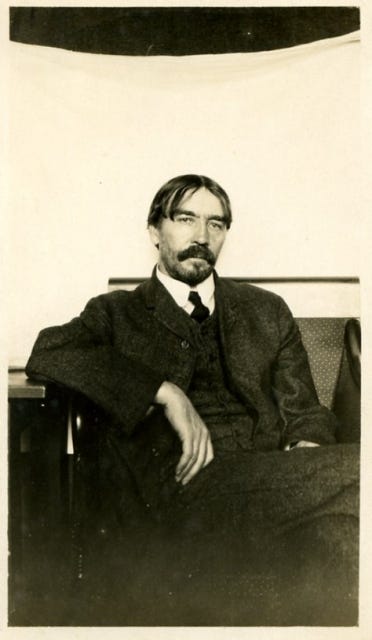Why luxury's favourite economist wanted to tear it all down
How did Thorstein Veblen, who despised the waste produced by elites, become a mascot to justify half a million dollar handbags?

A Hermès Diamond Himalaya Birkin made of crocodile skin in white and grey recently sold at auction for $450,000. LinkedIn posters, economists and luxury industry analysts would probably describe this as a “Veblen good”. This term is thrown around to describe all sorts of things, from Birkins to Rolexes to Roll-Royce cars. But who was Veblen, and what exactly is a “Veblen good”?
American academic Thorstein Veblen was the author of the seminal book The Theory of the Leisure Class, published in 1899. This book popularised terms such as “conspicuous consumption”, “pecuniary culture” and “pecuniary emulation”, putting academic rigour behind the idea that people were not just abstract, rational economic units who bought things to satisfy their material needs. Instead, his theory said, people buy things to show off, they link their self-worth to how much money they have, and they waste their money trying to keep up with their peers.
So what would the man himself think of the way his ideas are commonly used today, and the $500,000 Birkin? “He would have been absolutely furious, I’m sure. Spinning in his grave”, said Matthew Watson, professor of political economy at the University of Warwick, speaking to Dark Luxury via Zoom. “Veblen would have seen that as a huge misallocation of resources. How many social provisioning needs can you meet with half a million dollars? Why on earth would society consent to allowing half a million dollars of unmet social provisioning needs to continue, just so a handbag could be bought?” he said.
The term “Veblen good” is in fact a corruption of Veblen’s thinking. This apparently counterintuitive idea is loosely based on Thorstein’s realisation 125 years ago that extremely expensive activities and goods are considered desirable because they allow the people who can afford them to signal their greater wealth and their higher status above less financially advantaged people.
Loosely being the key word, because that is often where the explanation ends when Veblen goods are mentioned. Expensive luxury goods are expensive because they are expensive. That’s how it is, end of discussion. Get in line for your overpriced Birkin.
Perhaps conveniently for the executives who run and own the largest luxury goods companies, this logic has snuck into the back of the minds of people who advise the luxury and wealth advisory industries. It’s used by analysts to explain and justify the ridiculous prices that companies charge for leather handbags, it’s cited by blockchain entrepreneurs who call a $500,000 Bitcoin price a “Veblen threshold”, and by many LinkedIn and TikTok posters who profess to be experts in marketing who tell entrepreneurs to raise their prices by 500 per cent. It’s even leaked outside of luxury: people now talk about “Veblen stocks”, “Veblen labour markets”, “Veblen philanthropy”, and so on. Thorstein Veblen, who never once wrote the word “Veblen good”, would have hated all of this.
“I think it would have made Veblen’s head explode… he would be throwing tantrums, left, right and centre, looking at the way that the world has developed”, said Watson. “I think he would have assumed that his analysis of the social vulgarities of measuring yourself in that way at the expense of broader social progress was so blindingly obvious that nobody could be fooled into thinking it’s an acceptable way of life”, he said.
Watson says that marketers have latched onto Veblen’s ideas because they are useful for their commercial purposes. “You get those people who think, ‘Oh, what an opportunity. If people are really socially wired in the way that Veblen is suggesting they are susceptible to marketing techniques to play on their vanity. And then it becomes an appropriation of the broad idea for those commercial ends”, he said.
What did Thorstein Veblen actually think?

Veblen was born in Wisconsin in 1857 to Norwegian-American immigrant parents, living through the Gilded Age of material excess and political corruption to become a popular critic of capitalism. His ideas were hugely influential, and helped to inspire F Scott Fitzgerald’s writing in The Great Gatsby, and the work of Edith Wharton and Sinclair Lewis.



